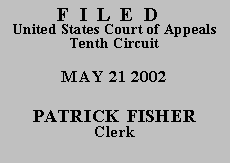

| UNITED STATES OF AMERICA,
v.
STEPHEN BRAY |
99-CR-102-R)
|
Petitioner Stephen Bray seeks a certificate of appealability to pursue his appeal of the district court's denial of his petition for a writ of habeas corpus filed pursuant to 28 U.S.C. § 2255. Petitioner pleaded guilty in federal district court to one count of possession of narcotics and one count of possession of firearms. The district court sentenced him to 87 months' incarceration. He argues on appeal that the sentence violates his constitutional rights under Apprendi v. New Jersey, 530 U.S. 466 (2000).
We must determine whether Mr. Bray is entitled to a certificate of appealability. In so determining, we examine whether he has made a substantial showing of the denial of a constitutional right. 28 U.S.C. § 2253(c)(2). "Where a district court has rejected the constitutional claims on the merits, the showing required to satisfy § 2253(c) is straightforward: The petitioner must demonstrate that reasonable jurists would find the district court's assessment of the constitutional claims debatable or wrong." Slack v. McDaniel, 529 U.S. 473, 484 (2000).
The defendant signed a plea agreement on August 24, 1999, which stated the maximum term of imprisonment that could be imposed as a result of the plea 20 years for possession of methamphetamine with intent to distribute in violation of 21 U.S.C. § 841(a)(1), and 10 years for possession of firearms not registered to him in violation of 26 U.S.C. § 5861(d). The grand jury indictment charged Mr. Bray with possession of approximately 1 ounce of methamphetamine, but the Presentence Investigative Report revealed relevant conduct of defendant involving an additional 700 grams of methamphetamine. The firearm count did not affect the guideline calculation. Mr. Bray's counsel objected to consideration of the uncharged quantity for sentencing because the government had not provided this information prior to the guilty plea, and he had expected a guideline range of 30-37 months. The court provided Mr. Bray an opportunity to withdraw his guilty plea, but he declined to do so. The district court judge held an evidentiary hearing, and found by a preponderance of the evidence that defendant was accountable for the uncharged quantity of methamphetamine. The court sentenced Mr. Bray to 87 months' imprisonment.
Mr. Bray challenged the district court's consideration of the uncharged quantity as a violation of Apprendi. The district court rejected his claim, because the Apprendi rule does not apply to sentencing factors that increase a defendant's guideline range but do not increase the statutory maximum. United States v. Sullivan, 255 F.3d 1256, 1265 (10th Cir. 2001). "[A]s long as the defendant's sentence falls within the maximum established by statute, Apprendi does not foreclose consideration of drug quantities beyond the offense of conviction." United States v. Hishaw, 235 F.3d 565, 577 (10th Cir. 2000). Mr. Bray's sentence of 87 months falls within the 20 year statutory maximum under § 841(b)(1)(C). The district court's finding that there was no Apprendi violation is not subject to debate by reasonable jurists.
Mr. Bray's request for a certificate of appealability is therefore DENIED and the appeal is DISMISSED. The motion to proceed on appeal in forma pauperis is GRANTED.
ENTERED FOR THE COURT,
Deanell Reece Tacha
Chief Circuit Judge
*.This order and judgment is not binding precedent, except under the doctrines of law of the case, res judicata, and collateral estoppel. This court generally disfavors the citation of orders and judgments; nevertheless, an order and judgment may be cited under the terms and conditions of 10th Cir. R. 36.3.